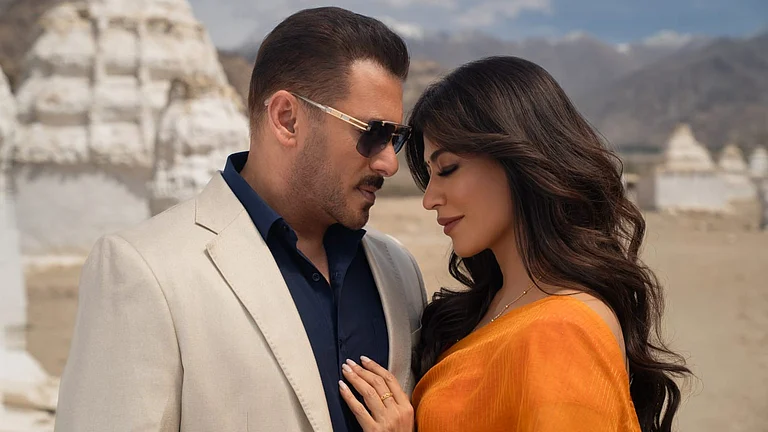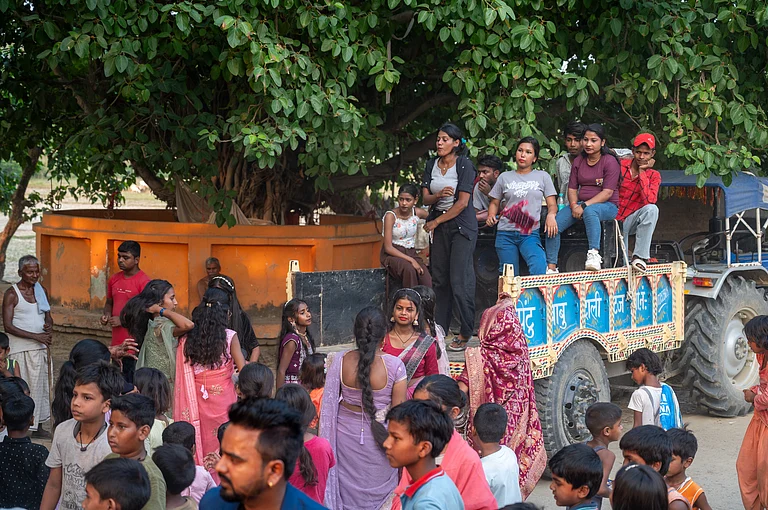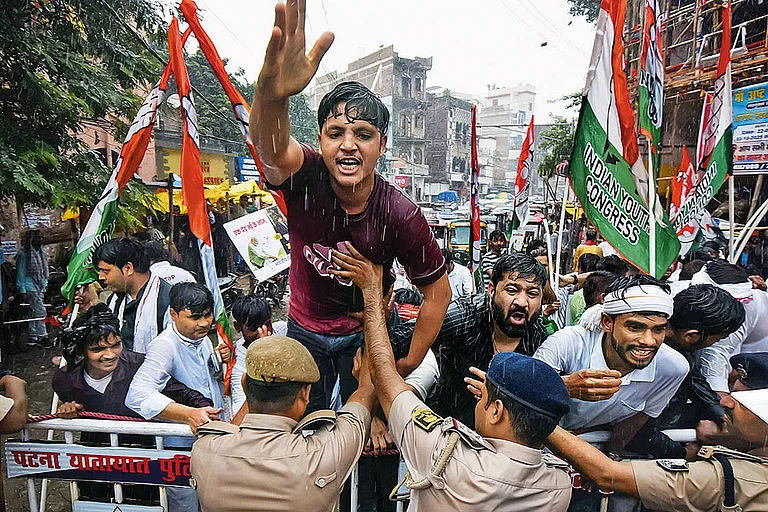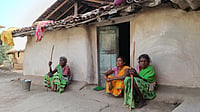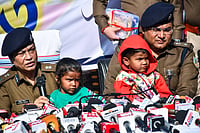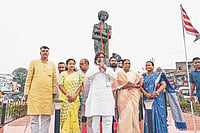
Summary of this article
Bhojpuri music’s rich legacy — from Bhikhari Thakur and Mahendra Misir — has collapsed into vulgar, sexist lyrics normalised by mass consumption.
Political parties now reward these obscene singers with election tickets, turning vulgarity into electability.
Artists and scholars warn that this trend marks not just cultural decline but society’s collective moral numbness.
In the hands of the underage Mukul, books have been replaced by a wrench, and the time meant for college has been taken over by a motorbike repair shop. Unbothered by this reality, Mukul is deeply absorbed in his work, his fingers swiftly rotating the wrench, his eyes alternating between the bike’s wheel and the mobile screen. On that screen is singer Golu Raja, addressing a woman in a lewd tone through his song — “Aao, khalihaan mein milte hain…” (“Come, let’s meet in the fields…”).
This rhythm that fills the scene has a name — Bhojpuri. For Mukul, who is about to turn 18, Bhojpuri is both music and cinema. Uninterested in Hindi songs, he says, “No one listens to Hindi songs here. Only Golu Raja, Khesari Lal, Pawan Singh, Guddu Rangeela, and Ritesh Pandey play.”
As one enters Kutubpur village, located on the banks of the Ganga in Saran district, obscene Bhojpuri songs blast from loudspeakers on rickshaws, autos, and carts. The singers Mukul refers to are infamous for their double-meaning and vulgar lyrics. Yet Mukul, aware of this, is unwilling to question his own preference.
Just three hundred meters away from Mukul’s repair shop, on the right side of the road, stands a statue of Bhikhari Thakur, where dozens of men, both young and old, are sitting gambling. Most of them do not even know whose statue they are sitting under. When asked, A few merely say, “He was from this village, a respected man.”
But alas, if even this handful of people in Kutubpur possessed as much understanding as Khesari Lal claims to, perhaps he would not have dared to compare his vulgar popularity with the legacy of Bhojpuri’s Shakespeare, Bhikhari Thakur.
Two Legacies; One Land
When Bhojpuri singer-actor Khesari Lal Yadav received an RJD ticket and addressed the media, he declared, “I come from the same land where Bhikhari Thakur was born. From that same soil, one Bhikhari emerged and another is Khesari.”
In his self-praise, Khesari unwittingly defined the abyss of difference between the two — the distance between sky and earth. On that same land, indeed, there was Bhikhari, and the other was Khesari.
Through songs like “Piya gailen Calcutta sajanwa, chhodi gailen humke akel ho Ram,” Bhikhari Thakur gave voice to women’s longing, loneliness, and economic dependence. He raised a profound question — “Is the world meant only for men? Who will understand women’s desires and pain?”
In contrast, singers like Khesari Lal have built their fame on filth — songs like “Ooo maja naikhe hamra bhatara me, jon maja dewra ke chhehatra me” — crude lyrics that weave soft pornography into the minds of young listeners.
Born in 1887, Bhikhari Thakur earned the title of Shakespeare of Bhojpuri. Over the course of his 84 years, he became a playwright, poet, singer, and social reformer — raising questions through his art about dowry, patriarchy, and social evils. His songs brought Bhojpuri culture national recognition and carried it across oceans.
These words are, in fact, too brief to describe his stature. Scholars have written hundreds of essays and theses on him. Yet the real question is, why is the Bhojpuri of Bhikhari Thakur dying in his very own village? How did the same language that travelled across the world through songs get reduced to vulgarity by today’s singers — Khesari Lal, Pawan Singh, Ritesh Pandey, Guddu Rangeela, and others?
Increasing Vulgarity Diluting Bhojpuri’s Dream Of Eighth Schedule Inclusion
For years, there have been demands to include Bhojpuri in the Eighth Schedule of the Constitution, with Bhikhari Thakur’s great-grandson Sushil Kumar among the advocates. However, he now feels that the dream has grown distant because Bhojpuri songs have descended into unprecedented vulgarity.
The tradition of actors turning into politicians was once confined to Bollywood. Over the past decade, that trend has entered the Bhojpuri industry, bringing figures like Manoj Tiwari, Ravi Kishan, and Dinesh Lal “Nirahua” into Parliament.
Last year, before the Lok Sabha elections, Pawan Singh joined the BJP, seeking a ticket from Karakat, but the party nominated him from Asansol, West Bengal. He refused, contested independently against NDA’s Upendra Kushwaha from Karakat , and lost. Recently, just before the Bihar assembly polls, he returned to the BJP. When speculation arose about his candidacy from Ara, his wife, Jyoti Singh, publicly revolted. Soon after, Pawan Singh announced he would not contest.
Yet, his presence remains. Though not contesting, he features among the BJP’s star campaigners. Infamous for vulgar songs, he recently made headlines again, caught on video inappropriately touching a female co-artist during a show. The video went viral, sparking outrage, and Pawan Singh was forced to apologise. This was not the first accusation; several similar charges have surfaced before.
Meanwhile, Prashant Kishor’s Jan Suraaj Party, despite its moral rhetoric, has joined the same league by fielding Ritesh Pandey, notorious for lewd lyrics, from Ara. In the Hindi heartland, almost no political party remains untouched by this race to the bottom.
One may debate whether Ritesh Pandey’s candidacy owes to his followers or his infamous hit — “Lawandiya London se laayenge, raat bhar DJ bajayenge…”
The Language Of Bihar Politics Through Song
And yet, Bhojpuri remains a language that transcends borders, especially through its music. When Prime Minister Narendra Modi visited Mauritius in March this year, he was greeted with Bhojpuri songs and customs, and even addressed the diaspora in Bhojpuri.
But when Bhikhari Thakur’s own descendants now say they feel ashamed of Bhojpuri, it is not merely tragic; it demands deep introspection.
Bhikhari Thakur’s great-grandson Sushil Kumar, disillusioned with today’s obscene songs, told Outlook, “Today Bhojpuri songs have made society so filthy that mothers and sisters cannot listen to them. How can these singers call themselves stars? I feel ashamed even to speak the Bhojpuri language.”
Theatre artist Nivedita Jha draws a sharp parallel: “Just as criminals were given political representation, now vulgar singers are being given tickets. Political parties have never had a moral compass. They don’t care about a candidate’s talent or cultural standing, but only popularity and winnability matter. And when society itself glorifies the vulgarity of Khesari Lal, Pawan Singh, or Ritesh Pandey, then society itself must be questioned. We’ve become so desensitised that obscenity no longer shocks us.”
Nivedita recalls that once, politics honoured grounded, culturally rooted artists — but that era has vanished.
Of course, not all Bhojpuri singers belong to the same rotten league. A few artists, such as Chandan Tiwari, continue to strive to restore dignity to Bhojpuri music. She told Outlook, “Both those who write and those who sing vulgar, misogynistic songs are equally responsible. It’s wrong to say society demands such songs; it’s a race for quick fame and easy money.”
Sushil Kumar advises these singers to learn from Bhikhari Thakur’s “Bidesiya” — how songs can carry social consciousness instead of sleaze.
“Bidesiya” is indeed a celebrated Bhojpuri folk theatre form, pioneered by Bhikhari Thakur. It portrayed the pain of migration, social injustices, and the struggles of common folk — giving voice, especially, to women’s grief. However, the same Bhojpuri society that Thakur once empowered now appears to be standing against those very same values.
How did Bhojpuri descend to this state? The decline is often traced to its visual commercialisation — its transformation from a musical to a cinematic culture. Bhojpuri was always meant to be heard, not seen.
The eminent music critic and historian Padma Shri Gajendra Narayan Singh once warned, “The moment Bhojpuri turns visual, it will degenerate. A day will come when society will fail to recognise its own daughters.”
That prophecy, sadly, has come true.
The Transformation Of Bhojpuri In 1990s
By the 1990s, Bhojpuri underwent a total transformation, and vulgarity became normalised. Yet, before this decline, Bhojpuri music had a rich and glorious heritage. While Bhikhari Thakur gave voice to women’s struggles, Mahendra Misir, born in 1886 in Mishrauliya village (Saran), enriched Bhojpuri with his Purbi style, singing of love, separation, and women’s emotional worlds. He is known as the Eastern Emperor of Bhojpuri music.
Mahendra Misir humanised tawaifs, singing of their pain and social exclusion with unmatched empathy. His grandson, Ramnath Mishra, who still lives in that village, laments, “My grandfather’s songs could be heard by mothers, daughters, wives, and sisters together. But today’s Bhojpuri songs are shameful — you can’t even listen to them with your own wife. If he were alive, he would be heartbroken.”
Amarnath Mishra, 75, now declines invitations to Bhojpuri festivals, saying, “Vulgarity has crossed all limits. One can no longer attend these programs with women and daughters.”
After Misir’s death in 1946, Bhikhari Thakur carried the torch till his last breath in 1971. Later came professional singers like Mohammad Khalil, who tried to modernise Bhojpuri songs beyond their folk roots. Around the same time, Sharda Sinha and Vindhyavasini Devi brought dignity and grace to Bhojpuri music, even as cinema icons like Lata Mangeshkar, Asha Bhosle, and Kishore Kumar lent their voices to the genre. This was Bhojpuri’s Golden Era.
But as veteran journalist and Bhojpuri scholar Nirala Bidesia notes, the stream muddied when Baleshwar Yadav arrived. Though initially a fine singer, his popularity led him toward vulgarity. Nirala recalls, “He sang the first obscene Bhojpuri song — ‘Chana ka khet chhota hai, ganna ke khet aana…’ — a barely veiled sexual invitation.”
By then, companies like T-Series and Tips had entered the market, producing albums in large quantities. In the 1990s, singers like Manoj Tiwari and Ravi Kishan emerged with songs like Lehenga Choli Uthawa, marking a turning point in Bhojpuri’s moral decline.
“When vulgarity entered Bhojpuri,” says Nirala, “songs shifted from the woman’s mind to her body. Society didn’t resist, and that silence killed our cultural pride. The same Bhojpuri that once celebrated Ravi Shankar and Bismillah Khan is now filled with ‘Nathuniya pe goli mare…’”
Ironically, Manoj Tiwari, now a BJP MP and once a Bhojpuri superstar, shares this concern. He admits, “There’s no doubt — most Bhojpuri songs today are vulgar. But we can’t only blame singers and lyricists. The market and music companies push them toward vulgarity.”
Bhojpuri Music: Does Vulgarity Equal Virality?
Why do vulgar songs become bigger hits?
Tiwari explains, “These singers have melodious voices. Bhojpuri listeners prioritise sound over words. If they maintained decency while retaining melody, people would still love them.”
He denies allegations that his own songs were double-meaning, arguing that critics fail to distinguish between romantic and vulgar.
Many Bhojpuri singers defend themselves, saying, “We sing what the audience demands.”
To this, Nivedita Jha responds sharply, “Every human being has a cultural hunger. People consume what is served to them. If you keep feeding filth, they’ll call filth entertainment.”
And so, when political parties in Bihar’s assembly elections field vulgar Bhojpuri singers as candidates, it reflects not just the moral collapse of politics but the ethical decay of society.
These are the same men whose songs demean women and normalise misogyny, who are now rewarded with tickets to represent the people. When politics abandons thought and morality for cheap applause and mass hysteria, it is not only the degradation of democracy, but a deep wound to the conscience of the public.





